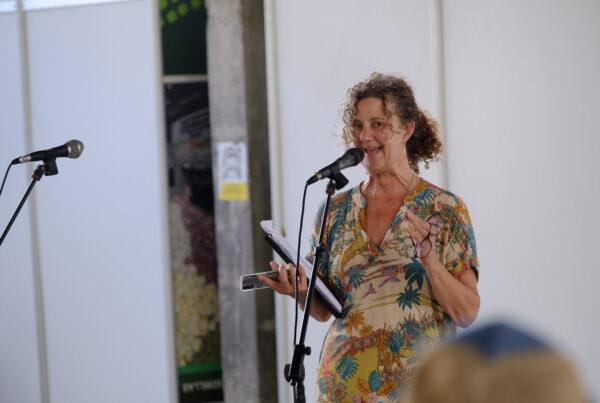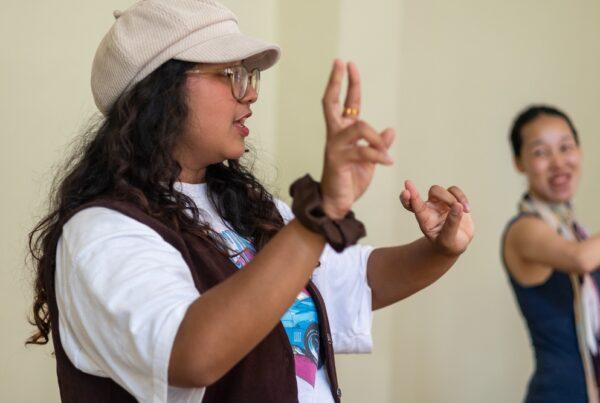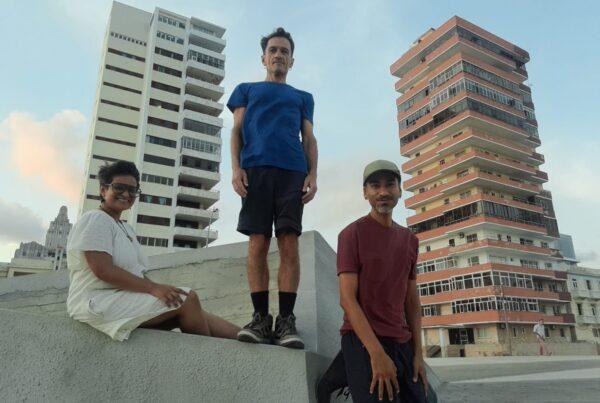As an external evaluator appointed by ASSITEJ International to assist the Executive Committee and Secretariat staff to examine to what extent the development of its network is building the collective resilience of the global Theatre & Performing Arts for Young Audiences sector, Dr. Richard Johnson Sallis, along with two colleagues from the University of Melbourne, Australia, estimates that his line of research differs to the other 5 streams of research currently assigned by ASSITEJ International.
“Putting it simply, we’re evaluating the future directions of ASSITEJ itself,” reveals Sallis, “ and due to the fact that ASSITEJ is 60 years old, our evaluation involves research as well,” he adds.
As part of the research aspect of things, Sallis visited the archives of ASSITEJ in Frankfurt, Germany last week. “I was looking into what is archived, how it’s archived, and most importantly, for anybody who’s interested in theatre for young people, what is there that they might be able to access themselves as well as how do they access that information,” says Sallis.
Over the years, ASSITEJ has published three books on its history, all the way back from when it started in 1965 up to 2005. These publications are also part of Sallis’ research. “What’s significant about that is that it shows important milestones in the history of ASSITEJ, when important decisions were made that has made ASSITEJ what it is today and certainly, as a generalisation, it will be true to say that whilst there have been pockets of research done over the years, it’s been more of what you might call a passion project for certain people; maybe they were doing a PhD, or some other some project or something at university, but it’s now that ASSITEJ is really seeing the value of research,” he says.

The fact that ASSITEJ is funded by the European Union, and an international organisation, will tie into Sallis’ work as well. “(Once evaluated), ASSITEJ will also be in a position to be looking wherever it can to receive funding. As we know, as well as research being educative, our funding bodies want evidence, and so one of the things that you will find across research projects, is that they provide both quantitative and qualitative evidence; funders look for statistics, how many, how often, that sort of thing. So part of the research projects are looking at that kind of quantitative data as well as stories and narratives. From my perspective and the team as external evaluators, we take a broader look things. And what we can see is that the research will be useful to people, because there is some research out there but nowhere near enough in the field of theatre for young audiences,” says Sallis. “All this information will then be able be disseminated more widely, and it also means that ASSITEJ will have an evidence base that it can draw from when it’s applying for funding and support, or when it needs to write a government report or whatever,” adds Sallis.
Another aspect of Sallis’ attendance at the Artistic Gathering is to seek whether there any things that can be learned from this experience. “I think it’s true to say that this is the first gathering that’s being tried out in a meaningful way; I’m sure they’re going to be learnings that come out of it,” says Sallis. “ASSITEJ is part of the Building Collective Resilience Project, which really is about connecting more with members and improving the networking, and so one of the things that we’re doing this week is observing how that network happens, what the opportunities are for people to network, what are the opportunities for people to better communicate with each other that are provided by ASSITEJ in a setting such as this gathering. So we’re looking at it on a more macro level, and we’re making recommendations,” concludes Sellis.
Dr Richard Johnson Sallis is an internationally recognised expert in the area of research-based theatre, especially in regard to its application in education.
He is Head of Drama Education in The University of Melbourne’s Graduate School of Education (MGSE). He is also the immediate past Chair of the University of Melbourne Theatre Board and the co-editor of the MGSE publication, Journal of Artistic and Creative Education (JACE).
His particular research interests include drama/theatre education; drama for wellbeing; theatre history; theatre for young people; diversity and inclusion in teaching and learning; and initial teacher education.
He is a member of the International Association for Creative Arts in Education (IACAET), Drama/NZ, and the Australian Children’s Theatre Foundation. Richard is a life member of Drama Victoria and is a recipient of the Drama Australia President’s Award for outstanding contribution to drama/theatre education. He also has affiliations with IDEA (International Drama and Theatre in Education Association), IDIERI (International Drama In Education Research Institute), Arena Theatre Company, and the Victorian Curriculum and Assessment Authority (VCAA).
His research has garnered a number of awards including the Freda Cohen Award for the ‘Most meritorious Masters thesis in education’, the ‘Fred Knight Research Scholarship’, and the American Alliance for Theatre Education’s (AATE) Distinguished Dissertation Award for his PhD entitled, ‘The Drama of Boys: an ethnographic study and its performance’.

Melissa Hekkers is a freelance journalist and author.
Her most recent book, Amir’s Blue Elephant, a creative non-fiction based on her experiences working in the Moria refugee camp in Lesvos, Greece and Cyprus. In 2018, she launched the My Cyprus Mandala Series, colouring books inspired by the natural and cultural heritage of Cyprus. In 2007, she published her first children’s book in both English and Greek entitled Crocodile, which won the Cyprus State Illustration Award. In 2012, she launched her second children’s book Flying across Red Skies (in English and Greek), using an experimental approach to literature, for which she was nominated for the Cyprus State Literary award. Her third, similarly well-received children’s book was Pupa (Greek and English), published in 2014 and was adapted as a theatre play in 2019. In between her last two books, she published her first free-verse poetry book entitled Come-forth. In 2019 she was contributing author to the anthology Nicosia Beyond Barriers: Voices from a Divided City, published by Saqi Books, London.





